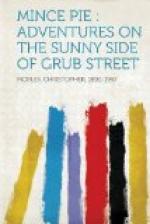It would not surprise me if at some future time Mrs. Bedell’s boarding house, on Jackson Street in Hempstead, becomes a place of pilgrimage for lovers of the essay. They will want to see the dark little front room on the ground floor where Owd Bob used to scatter the sheets of his essays as he was retyping them from a huge scrapbook and grooming them for a canter among publishers’ sanhedrim. They will want to see (but will not, I fear) the cool barrel-room at the back of George D. Smith’s tavern, an ale-house that was blithe to our fancy because the publican bore the same name as that of a very famous dealer in rare books. Along that pleasant bar, with its shining brass scuppers, Bob and I consumed many beakers of well-chilled amber during that warm summer. His urbanolatrous soul pined for the city, and he used in those days to expound the doctrine that the suburbanite really has to go to town in order to get fresh air.
In September, 1916, Holliday’s health broke down. He had been feeling poorly most of the summer, and continuous hard work induced a spell of nervous depression. Very wisely he went back to Indianapolis to rest. After a good lay-off he tackled the Tarkington book, which was written in Indianapolis the following winter and spring. And “Walking-Stick Papers” began to go the rounds.
I have alluded more than once to Mr. Holliday’s book on Tarkington. This original, mellow, convivial, informal and yet soundly argued critique has been overlooked by many who have delighted to honor Holliday as an essayist. But it is vastly worth reading. It is a brilliant study, full of “onion atoms” as Sydney Smith’s famous salad, and we flaunt it merrily in the face of those who are frequently crapehanging and dirging that we have no sparkling young Chestertons and Rebecca Wests and J.C. Squires this side of Queenstown harbor. Rarely have creator and critic been joined in so felicitous a marriage. And indeed the union was appointed in heaven and smiles in the blood, for (as I have noted) Mr. Holliday’s grandfather was the biographer of Tarkington’s grandsire, also a pioneer preacher of the metaphysical commonwealth of Indiana. Mr. Holliday traces with a good deal of humor and circumstance the various ways in which the gods gave Mr. Tarkington just the right kind of ancestry, upbringing, boyhood and college career to produce a talented writer. But the fates that catered to Tarkington with such generous hand never dealt him a better run of cards than when Holliday wrote this book.
The study is one of surpassing interest, not merely as a service to native criticism but as a revelation of Holliday’s ability to follow through a sustained intellectual task with the same grasp and grace that he afterward showed in the memoir of Kilmer in which his heart was so deeply engaged. Of a truth, Mr. Holliday’s success in putting himself within Tarkington’s dashing checked kuppenheimers is a fine achievement of projected psychology. He




